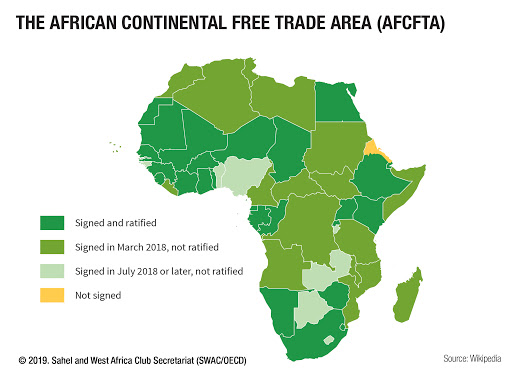Trade and investment stakeholders in Nigeria at the weekend outlined ways the country could effectively mobilise for the Africa Continental Free Trade Area (AfCFTA).
They made the submissions at a virtual ‘Nigeria Investment Conference’ with the theme: “Nigeria Beyond Oil: Growing Regional and Global Trade Under the #AfCFTA”.
The event was hosted by Nazaru LLC, a U.S-based firm that connects the world to Africa through trade and investment facilitation, with support from the Nigerian Consulate in New York.
Mr Kola Awe of the Nigerian Association of Chambers of Commerce, Industry, Mines and Agriculture (NACCIMA), called on the private sector to take responsibility for capacity mobilisation for the AfCFTA.
Awe, who is the Chairman of NACCIMA’s Export Group, noted that the government cannot do everything given the myriad challenges it faced, as such the Organised Private Sector (OPS) should work around the challenges in the system, to effectively position its members for the AfCFTA.
In this regard, he said, focus should be on the country’s Micro, Small and Medium Enterprises (MSMES), which remained unprepared for the regional market.
“A lot of people might want to say we are set when they look at the large industries and multinationals. How many people do they employ? Basically, the big companies are set and can mobilise capacity, finance, infrastructure and everything that they need to take advantage of the AfCFTA; but we cannot say the same for the MSMEs, which are the largest employers of labour. There are over 80 million MSMEs here in Nigeria, and if one is employing one person, do you know how many all of them will employ?”.
He urged the big companies to carry the MSMEs along by breaking the barriers between them and providing them with trade data, through product and country mapping.
“We need to start working on product maps. We need to start looking at those people with comparative advantage in those products and the countries they need to be going to. We cannot wait for the government to do a product and country map for us. The private sector should”.
Earlier in her presentation, the event host and founder of Nazaru, Mrs Toyin Umesiri, urged Nigeria to identify its top five priority countries and sectors under the AfCTFA.
“This means, map the countries, map the sectors, and see what sectors in other countries you want your private sector players to penetrate and start building strategies around that”.
She appealed to the government to provide a single window for trade and investment information for both local and foreign players, while advising Nigerian businesses wishing to participate in the AfCFTA to study the rules of engagement in the regional and local markets.
“If you have been winning in your local market and you want to go regional or global, you cannot bring the same principles; because the principles you use on the local market will fail in the regional and global markets”.
She stressed the need for Nigerian players to open up to third-party agents in other countries, especially in the provision of logistics.
“If a Nigerian exporter wants to penetrate the Egyptian market, for example, it is important that they work with agents in Egypt who understand the market. To fast track winning under the AfCFTA, we have to be open to structuring new and dynamic partnerships”.
Mr Arnold Jackson, a Regional Coordinator of the Nigerian Export Promotion Council (NEPC), said the agency had developed a “Zero Oil Plan” aimed at boosting the country’s non-oil exports.
Jackson stated that under the plan, which is built into the “Federal Government’s Economic Recovery and Growth Plan”, is a “One-State-One-Product” initiative that prioritizes products and sectors where Nigeria has comparative advantage.
He highlighted the services, entertainment, financial and ICT sectors as areas where Nigeria has strength, and which could be prioritised under the AfCFTA.
Mr Emeka Offor, the Director of Strategic Communications, Nigeria Investment Promotion Commission (NIPC), spoke on government’s efforts in the facilitation of trade and investment, saying that the NIPC had since opened a ‘Single Window Investment Portal’ that provides real-time information to intending investors around the world.
“Yes, there are challenges in doing business in Nigeria, but the government is doing a lot to ensure they are mitigated, and that is why we have the NIPC. We can hand-hold investors to walk through those challenges. It is very important. That is why we say, if you are thinking of doing business in Nigeria you should talk to NIPC”.

